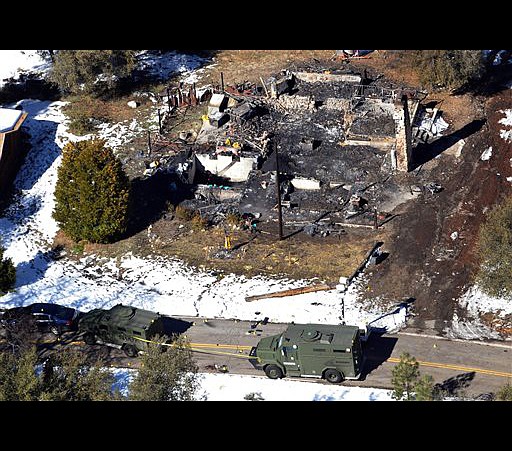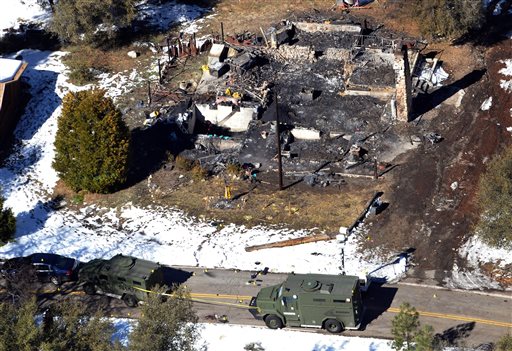Reward for murderous ex-cop causing controversy
Friday, March 29, 2013
LOS ANGELES - As a cabin smoldered with the body of rogue ex-cop Christopher Dorner inside, politicians in a city that lost an officer to his rampage approved a $100,000 reward for information leading to his arrest and conviction.
The Riverside City Council voted unanimously with little discussion and no debate, even after being told the fugitive's demise was likely to be announced soon.
News of the vote was dwarfed by Dorner's death after a week on the run, but the city made headlines this week when it said it wouldn't pay its slice of the massive $1.2 million that was pledged by more than two dozen entities and elicited hundreds of tips.
Blame the fine print - the requirement of an arrest and conviction - for the latest wrinkle in the battle over the pot of money that remains unpaid more than six weeks later. As a probe into who should get the cash continues, competing claims for the money have led to finger pointing, and at least two of the 30 groups that backed the bounty have bowed out of the tortured process.
A lawyer for the couple who called police after Dorner tied them up in their Big Bear Lake condominium and fled in their car shortly before his Feb. 12 death accused Riverside of reneging on an offer that was never genuinely made.
"The mayor knew full well that he wasn't going to be convicted when he authorized the resolution," said attorney Kirk Hallam. "It is completely disingenuous for him to stand up there now and say, 'Oh we weren't legally authorized to issue this.' Really? That's not what you said when you offered the ordinance to the City Council after the facts were already known."
Cobbled together quickly as the manhunt for Dorner went cold on a snowy mountain where he abandoned his truck, the reward was hastily announced over a weekend by multiple police chiefs and mayors. It was never formally put in writing and was offered before public boards were able to authorize the money or set conditions for payment.
No one expected the imbroglio that has followed as lawyers for two parties have sparred over who should get the reward. Officials are expected to announce the payout by mid-April.
While Los Angeles Mayor Antonio Villaraigosa and Police Chief Charlie Beck have said they want to the see the reward paid, at least one group other than Riverside has chosen not to pay.
The board of the 64,000-member union Peace Officers Research Association of California rejected paying its $50,000 share because Dorner, whose four victims included two police officers, died before he could be arrested or convicted, President Ron Cottingham said Friday.
Rewards have long been an important tool to crack unsolved crimes and smoke out criminals. Posters in the 1800s offered payouts for outlaws "dead or alive," inspiring vigilantes and bounty hunters to take the law into their own hands. Today, they focus on generating tips from people who may fear retribution and may want to remain anonymous.
The arrest of Boston mobster James "Whitey" Bulger, suspected of playing a role in 19 killings and atop the FBI's Ten Most Wanted Fugitives list, was nabbed in Santa Monica two years ago after a publicity campaign and $2.1 million reward drew a tip from a former neighbor.
Fine print can complicate matters. The requirement of a conviction guarantees that the right person ends up behind bars, but it can delay a payout for years.
Crime Stoppers, created in 1976 as a nonprofit, pays up to $1,000 for information leading to arrests. Money raised by donations from citizens and corporations has helped pay close to $100 million to tipsters - and that reflects only the 20 to 30 percent who claim the money, said Chairman John Lamb.
"I think the majority of people who don't ask for reward money are trying to do the right thing," Lamb said.
Hallam, who represents Karen and Jim Reynolds, said his clients deserve the money because they put police on Dorner's trail. Despite being bound and gagged, and told not to alert police, Karen Reynolds managed to call 911 to report that Dorner had fled in their purple SUV.
During the ensuing pursuit, Dorner crashed their vehicle and carjacked a pickup truck from Rick Heltebrake, who also called authorities. He also filed a claim for the reward.
Cottingham, president of the umbrella group representing California police unions, said officials first announced the reward was for "capture and conviction" and then just "capture" during the manhunt, causing confusion and the problems that now exist.
"Maybe we learned a lesson here to make sure the parameters are set before you start" issuing a reward, Cottingham said.
Riverside city politicians defended their decision to vote after Dorner didn't emerge from the cabin that burned to the ground after a gunbattle with law enforcement.
There were conflicting reports the night of the vote about whether Dorner's body had been found, said Councilman Mike Gardner.
"There was never an intent to authorize a reward knowing it wouldn't be paid," Gardner said.
Hallam said Riverside should consider reviewing a state law that provides for the governor to pay rewards in police officers' killings even if the arrest or conviction is "rendered impossible by an intervening event, including but not limited to, the death of the person during a pursuit by law enforcement."
Frank Zimring, a law professor at the University of California, Berkeley, said the city of Riverside can legally not pay the reward, but it could hurt the city in the future.
"The problem is going to come the next time Riverside wants to get the public's attention by offering a reward, because the issue is really the community's long-term credibility," Zimring said.
While the city of Riverside has pulled its reward, the county specifically changed its reward language to assure it wasn't only symbolic.
The Riverside County Board of Supervisors met the day after Dorner's death to authorize its $100,000 contribution. After some debate, the board voted unanimously to approve the amount and to change the language from "arrest and conviction" to "apprehension."
"The bottom line is if these individuals were helpful to get law enforcement to put this issue to an end ... then it should be offered," Supervisor John Tavaglione said during the meeting.

